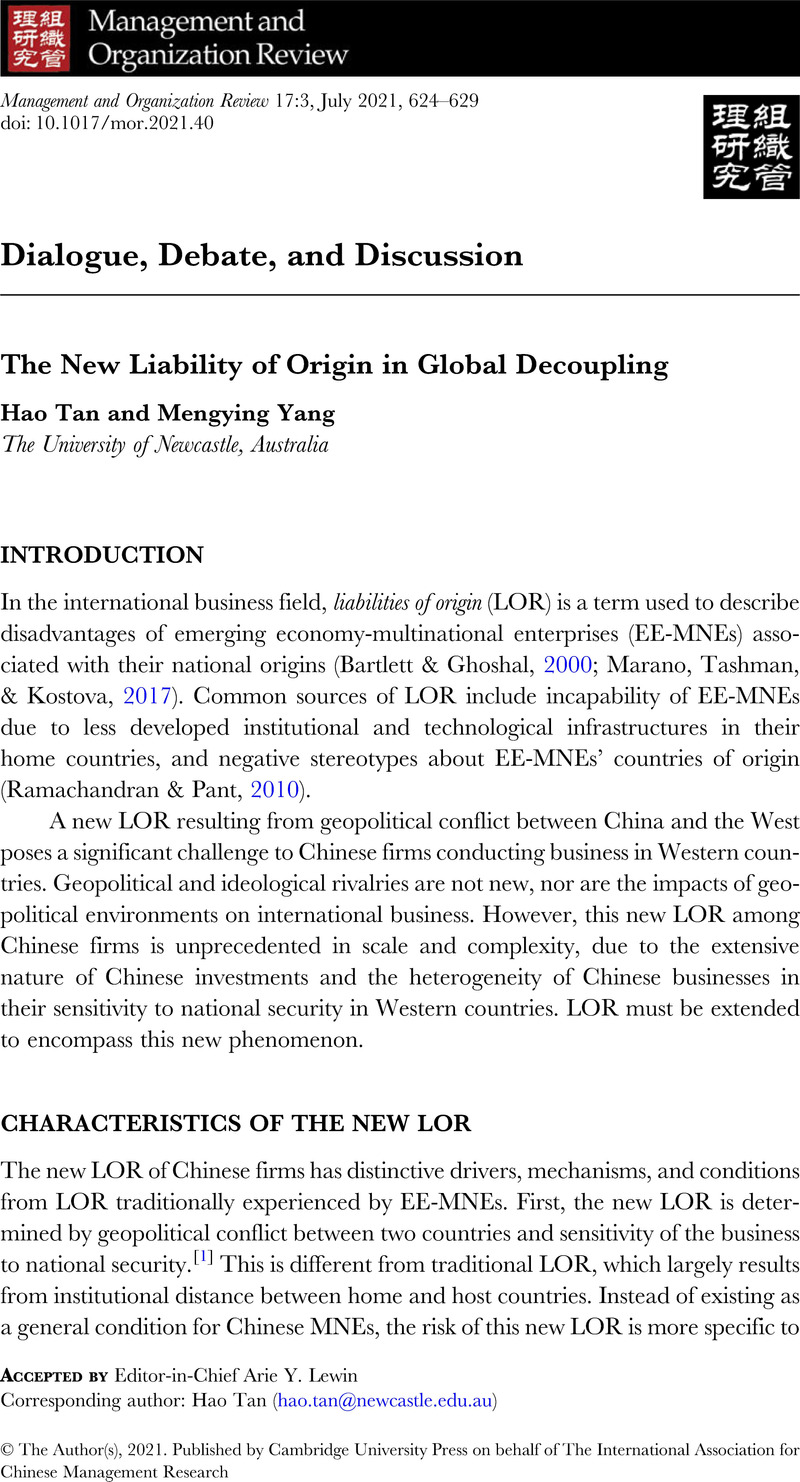Crossref Citations
This article has been cited by the following publications. This list is generated based on data provided by Crossref.
Zhang, Chun
and
Gao, Hongzhi
2022.
Managing business-to-business disruptions: Surviving and thriving in the face of challenges.
Industrial Marketing Management,
Vol. 105,
Issue. ,
p.
72.
Jiang, Tingting
Yang, Buyun
Yang, Bo
Wu, Bo
and
Wan, Guoguang
2022.
How does liability of origin influence cross-border acquisition completion? Evidence from Chinese firms.
Chinese Management Studies,
Vol. 16,
Issue. 4,
p.
857.
Dai, Shuanping
Li, Zheng
and
Li, Jun
2022.
Guest editorial: Institutions, corporate governance and entrepreneurship: a research agenda for Chinese world-class enterprises.
Chinese Management Studies,
Vol. 16,
Issue. 4,
p.
733.
Li, Jing
Shapiro, Daniel
Peng, Mike W.
and
Ufimtseva, Anastasia
2022.
Corporate Diplomacy in the Age of U.S.–China Rivalry.
Academy of Management Perspectives,
Vol. 36,
Issue. 4,
p.
1007.
Wei, Jiang
Zheng, Jie
and
Zuo, Yan
2023.
Overcoming the liability of origin: cross-listing in developed economies as a signal.
International Journal of Emerging Markets,
Vol. 18,
Issue. 11,
p.
5319.
Tan, Hao
2023.
Declining industries in emerging economies and firms’ strategies.
critical perspectives on international business,
Vol. 19,
Issue. 2,
p.
234.
Fjellström, Daniella
Bai, Wensong
Oliveira, Luis
and
Fang, Tony
2023.
Springboard internationalisation in times of geopolitical tensions.
International Business Review,
Vol. 32,
Issue. 6,
p.
102144.
Gao, Hongzhi
Ren, Monica
and
Shih, Tsui-Yii
2023.
Co-evolutions in global decoupling: Learning from the global semiconductor industry.
International Business Review,
Vol. 32,
Issue. 6,
p.
102118.
Witt, Michael A.
Lewin, Arie Y.
Li, Peter Ping
and
Gaur, Ajai
2023.
Decoupling in international business: Evidence, drivers, impact, and implications for IB research.
Journal of World Business,
Vol. 58,
Issue. 1,
p.
101399.
Ren, Monica
and
Gao, Hongzhi
2023.
Chinese State-Owned Multinationals' (SOMNEs) Subsidiary nonmarket strategies in Selective De-globalization: An integrated perspective of co-evolution theory and the yin-yang frame.
Journal of International Management,
Vol. 29,
Issue. 6,
p.
101069.
Kuo, Anthony
Chien, Donna
and
Kao, Ming‐Sung
2024.
Interplay of national and firm environmental, social, and governance performances: Reshaping multinational enterprises' employer attractiveness across home and host countries.
Corporate Social Responsibility and Environmental Management,
Vol. 31,
Issue. 6,
p.
5938.
Hung, Kai-Hsin
2024.
Artificial intelligence as planetary assemblages of coloniality: The new power architecture driving a tiered global data economy.
Big Data & Society,
Vol. 11,
Issue. 4,
Dai, Haiwen
Qualls, William J.
and
Zhu, You
2024.
Win, lose, or draw? Forecasting the outcome of a race toward a dominant formal standard with machine learning.
Technological Forecasting and Social Change,
Vol. 205,
Issue. ,
p.
123499.
Zhang, Jintao
Chen, Stephen
and
Tan, Hao
2024.
Is there a relationship between environmental performance and outward FDI? A study of Chinese MNEs.
Multinational Business Review,
Vol. 32,
Issue. 1,
p.
1.
Huang, Xinli
Liang, Yanze
and
Webber, Don
2024.
Strategic asset-seeking acquisitions by emerging market multinational enterprises and the liability of emergingness.
Journal of International Management,
Vol. 30,
Issue. 4,
p.
101157.
Shams, Riad
Sohag, Kazi
Islam, Md. Monirul
Vrontis, Demetris
Kotabe, Masaaki
and
Kumar, V.
2024.
B2B marketing for industrial value addition: How do geopolitical tension and economic policy uncertainty affect sustainable development?.
Industrial Marketing Management,
Vol. 117,
Issue. ,
p.
253.
Shirodkar, Vikrant
Liedong, Tahiru Azaaviele
Rajwani, Tazeeb
and
Lawton, Thomas C.
2024.
MNE nonmarket strategy in a changing world: Complexities, varieties, and a values-based approach.
International Business Review,
Vol. 33,
Issue. 2,
p.
102251.
Liu, Junying
Wang, Ying
and
Du, Xueyao
2025.
The impact of autonomy on sustainable performance in foreign subsidiaries: an empirical study from Chinese construction industry.
Engineering, Construction and Architectural Management,
Vol. 32,
Issue. 2,
p.
1370.
Xu, Yuehua
Li, Jiatao
Wang, Yimin
Xin, Li
and
Zhao, Haichuan
2025.
Exploring Corporate Philanthropy, Home Country Foreign Aid, and Country of Origin-Based Stigma for Multinational Enterprises: An Experimental Study.
Journal of World Business,
Vol. 60,
Issue. 3,
p.
101623.
Yu, Jiang
Fang, Yuanxin
Bai, Yutong
and
Chen, Feng
2025.
Building resilience amidst geopolitical tensions: The case of U.S. MNE subsidiaries in China.
Journal of International Management,
Vol. 31,
Issue. 4,
p.
101260.


